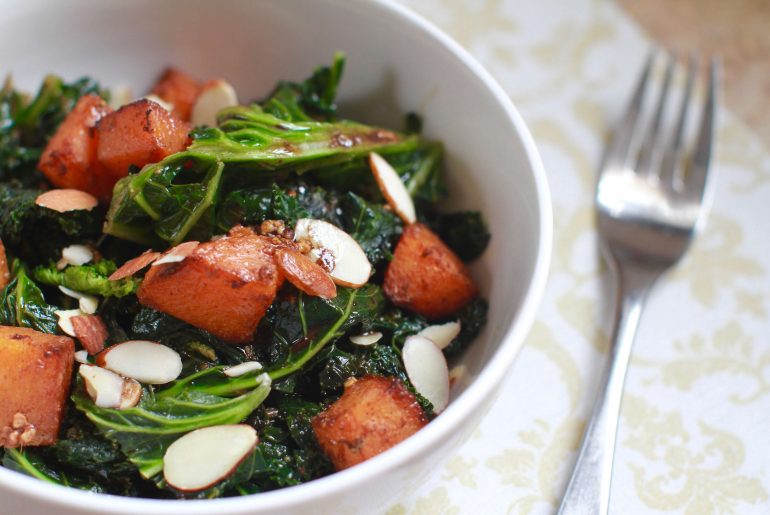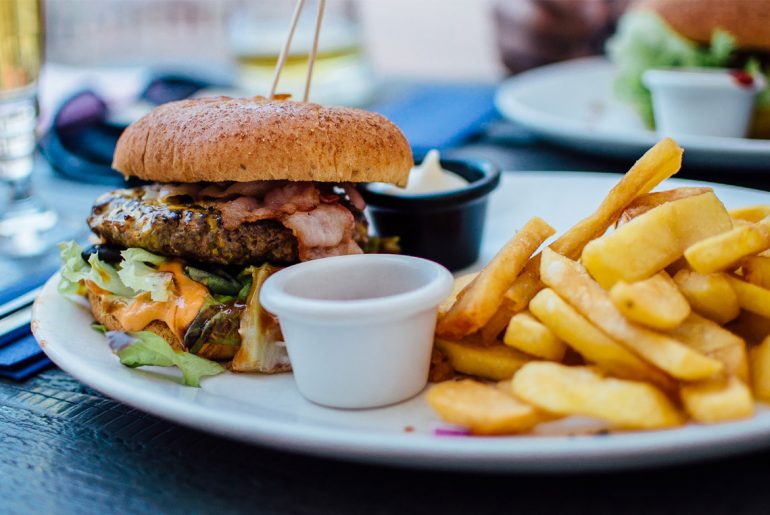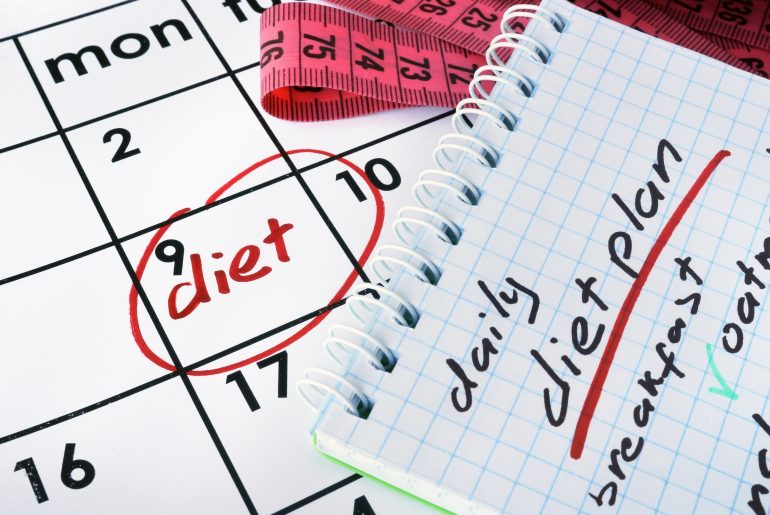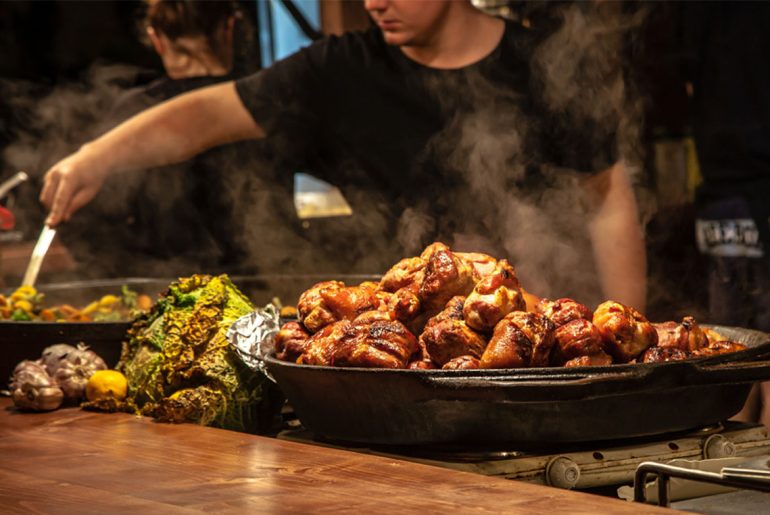This filling, savory salad is just what you need to stick to your healthy diet. It’s loaded with flavor, but also packs a punch with tons of heart-healthy kale. One cup of kale contains contains a mere 33 calories, but 206 percent of your daily recommend vitamin A (healthy hair and skin), 134 percent of your vitamin C (immune system), and a whopping 680 percent of your vitamin K. Yes, that much! It’s one of the best foods around for fighting inflammation and maintaining healthy bone density. And kale is packed with fiber which will keep you fuller longer, while also aiding in lowering cholesterol. Enjoy kale in this salad and all your salads and feel your best. Kale, Butternut Squash salad with almonds Serves 2-3 Ingredients 1 1/2 cups cubed butternut squash 1 tbsp cinnamon 1 tsp light brown sugar 1 bunch kale, stems removed 6 tbsp extra virgin olive oil 3…
Here’s how much you can eat over the holidays to lose or maintain weight
You no surprise that you’re likely to pack on a few pounds over the holidays. The extra appetizers, cocktails with friends, side dishes, desserts and post-meal champagne can quickly add up to an average of 7,000 calories on a holiday — more than triple the daily recommendation. Shockingly, 29 percent of people estimated they would eat fewer than 3,000 calories over the course of Christmas Day. While it’s just one day — and who counts calories on Christmas anyway? — it’s worth taking a peek at MealKitt’s photo series on portion control. Julian Gaine, the CEO of the British company known for its portion control tool, released photos showing what Christmas Day plates should look like if you’re looking to lose, maintain or gain weight. While this might not be your exact meal, the images can serve as a guide which you use to gauge how full your plate should be. For those…
Signs you’re addicted to food, and how to overcome it
We all have bad days when our sour mood gets the best of us and we end up binging on bags of potato chips and Netflix in an attempt to cope. But there’s a difference between reaching for comfort food now and then and a full-blown food addiction. But if you’re not sure where your habits lie, you’re not alone. Food addicts aren’t entirely different from folks who overeat. The same ingredients that cause intense cravings can also cause addiction. “The food industry makes food intentionally addictive,” Vera Tarman, MD, MSc, FCFP and author of Food Junkies: The Truth About Food Addiction, told Dr. Oz, The Good Life. Some people have genetics that make them even more susceptible to developing addiction. “There’s a subpopulation who gets that hook like everyone else, but then they’re vulnerable because of a previous addiction or genetics,” Dr. Tarman said. “It’s like an alcoholic who can’t put down a…
Why being skinny was easier for your parents
It’s unfair but true: Even if young adults today ate the same diet as their parents did at the same age, they would still be heavier. According to a study published in Obesity Research & Clinical Practice, adults in the ’70s could eat more food and exercise less with significantly less chance of gaining weight. The study observed the diets of 36,400 Americans between 1971 and 2008, as well as physical activity logs of 14,419 people between 1988 and 2006. Researchers found that people whose eating and exercise patterns were on par with people 20 or 30 years ago, still weighed about 10 percent more. The study shows that weight management is much more complex than commonly thought. “Our study results suggest that if you are 25, you’d have to eat even less and exercise more than those older, to prevent gaining weight,” Jennifer Kuk, a professor of kinesiology and health science…
Study finds big breakfasts lead to weight loss
You already know that breakfast is the most important meal of the day, but a new study shows that it should also be the biggest meal of the day if you’re looking to lose weight. Researchers at Loma Linda University in California tracked 50,000 participants, age 30 and older, for seven years. Results published in the Journal of Nutrition show that not only was eating breakfast associated with a lower body mass index, but so was making it the biggest meal of the day. Dr. Hana Kahleova, one of the study’s authors, told KCBS that, “People who are regularly eating breakfast have better chances of keeping their body weight compared to those who are skipping breakfast.” The theory is that eating in the a.m. means you’ll be less likely to reach for snacks or heavy meals later in the day when you have less healthy options available and less time…
Why you should never start a diet on a Monday
It’s Friday and your next three days are full of booze, brunches and backyard barbecues. Monday is the day you’ll start to diet, you tell yourself. But start a diet on a Monday, and you might not have much success. According to a study published in the European Journal of Clinical Nutrition, people eat the most meat on Saturday and Sundays and the most carbs and alcohol on Fridays and Saturdays. The most calories are consumed Friday through Sunday. While this likely doesn’t come as a shock, these habits make dieting on Monday — and sticking with it — all the more difficult. “Typically, the ‘I’ll get back on track on Monday principle’ is a dangerous one,” says dietician Jaime Mass, R.D. “It indicates an all-or nothing-mentality, which can lead to unhealthy eating habits overall,” she said. As soon as you cave into your cravings at some point in the week, it…
Smelling food can make you fat, new study shows
Your nose might be sabotaging your weight loss efforts. New research has revealed that simply smelling food can make you pack on the pounds. Yikes! The study, conducted by UC Berkeley researchers and published in Cell Metabolism, used three groups of mice — a set of “super-smellers,” a group whose smell was temporarily disabled, and a control group. The mice ate the same amount of a “Burger King diet.” When the mice weighed in at the end of the study, those with the impaired sense of smell gained the least weight — a mere 10 percent of their body weight, while the “super smellers” gained the most weight — nearly doubling in size. The findings show that your olfactory system affects your appetite as well as your metabolism. The normal mice, of course, ballooned in size too. “In the context of food and appetite, this is really novel,” lead study author Celine Riera told SF Gate. However,…







